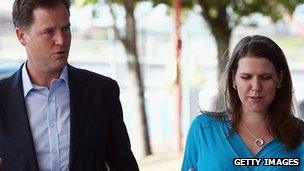Nick Clegg calls for more openness on gender pay gap
- Published

Nick Clegg and Jo Swinson have both lent their support to the Make Them Pay campaign
Women should "feel free" to ask their employers how much they earn in comparison to their male colleagues, Deputy Prime Minister Nick Clegg says.
Mr Clegg told Elle UK Magazine, external he supported its campaign for more openness on the matter of equal pay.
Women and Equalities Minister Jo Swinson also called on women to "confront" the issue.
Firms have been warned they could be forced by law to reveal pay differences if voluntary measures to be open fail.
The government's Think, Act, Report scheme encourages companies to publish as much information on pay as possible.
'Stubborn problem'
Both Mr Clegg and Ms Swinson have spoken out in support of the Make Them Pay campaign - a joint project supported by Elle, The Feminist Times and advertising agency, Mother London.
The project urges women to ask men about their salaries to ensure they are not being paid less to do the same job.
In his interview, Mr Clegg told the magazine: "Women should feel free to ask male colleagues how much they earn in the same jobs and I'm sure most men would want to help.
"This is a simple step which could have a big impact. But the gender pay gap is a stubborn problem."
The Liberal Democrat leader said men also needed to do more of the "heavy lifting" in childcare, so women were not forced to put their careers on hold.
The government has not enacted plans, inherited from Labour, to make pay audits mandatory.
However, it has given employment tribunals the power to force employers that break equal pay laws to carry out reviews.
In a separate interview with Elle, Miss Swinson said the British reluctance to talk about money "holds women back".
While being open about salaries could be uncomfortable, it could also be the "catalyst" for female workers to seek pay rises, she suggested.
"I would agree that while the pay gap is reducing a bit, it's not reducing enough," she said.
"We're 40 years on from the initial legislation to say that men and women ought to be paid equally.
"I think we need to recognise the government does have the power to impose equal pay audits, and it may well be that if we do not see success through Think, Act, Report, that might be the only way to make this happen."
- Published3 October 2013
- Published3 October 2013
- Published20 August 2013